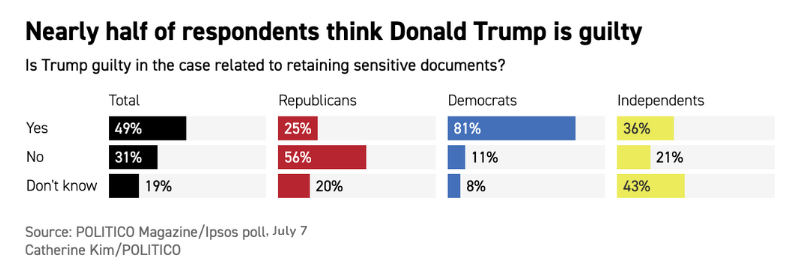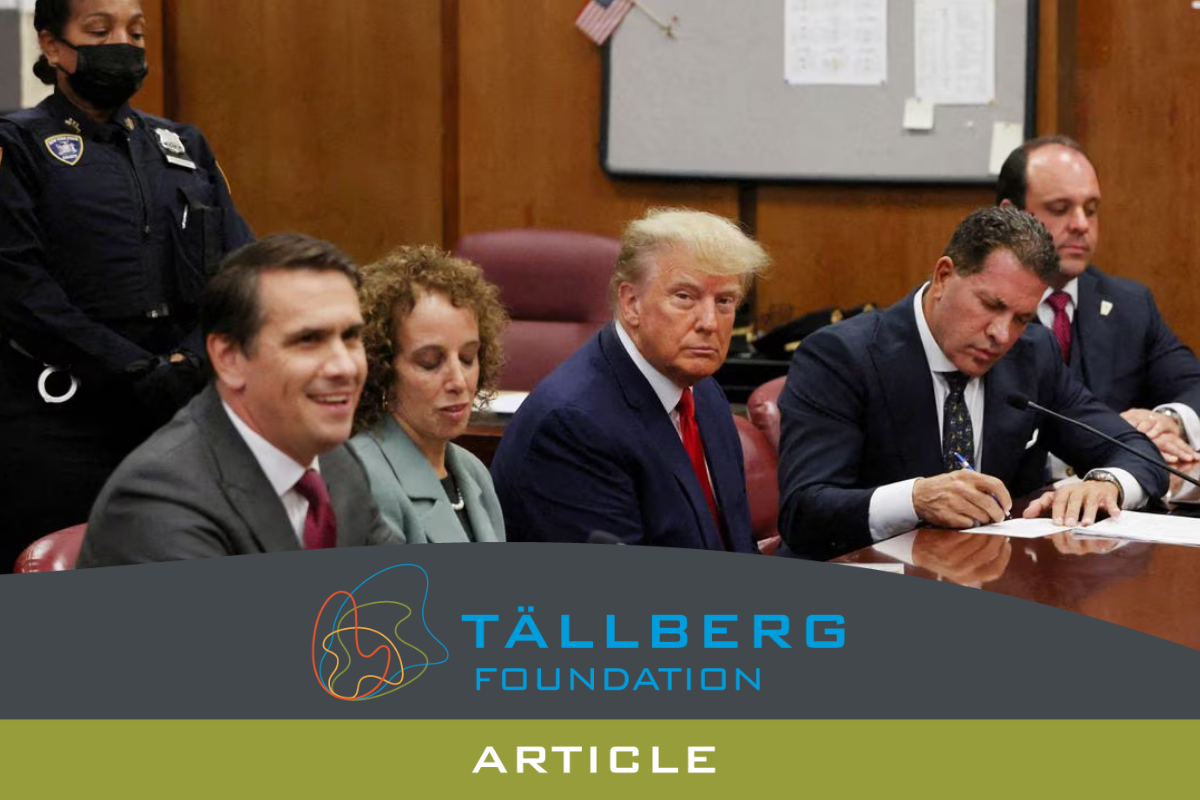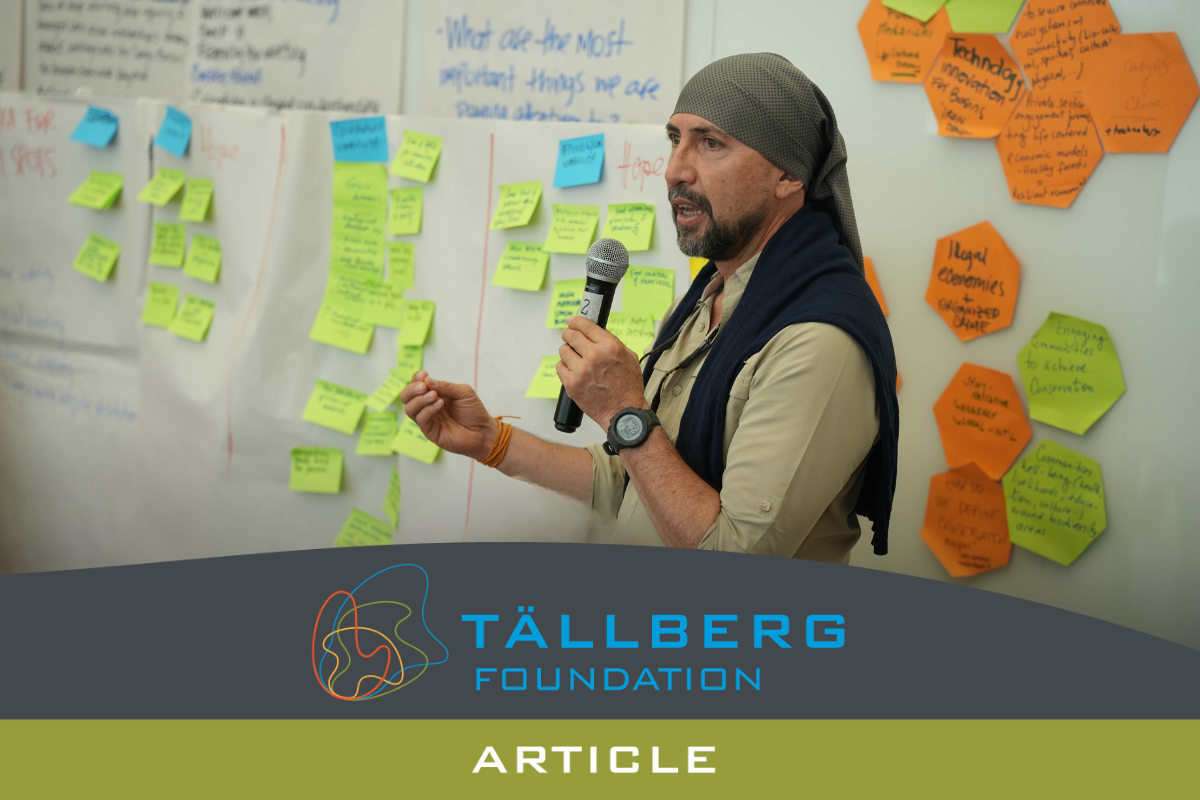Imagine a new blockbuster movie in which a former American president, running for re-election, is criminally indicted not once or twice, but four times. He has to run for office with all the bread and circuses that modern campaigns demand on some days of the week, while on others he sits quietly in a courtroom listening to prosecutors and witnesses accuse him of crimes that could jail him for the rest of his life.
Would you greenlight the script?
The good news is that you won’t have to, since that very scenario is now unfolding in United States of America v. Donald Trump and The People of the State of New York against Donald J. Trump with two more indictments, one federal and one state (Georgia), apparently on the way.
A once and possibly future president in the dock? “Even for someone who was a prosecutor for a long time and a former acting U.S. Attorney, this is unprecedented and a huge deal,” says Joon Kim, who served as Acting US Attorney and Assistant US Attorney for the Southern District of New York. “Thinking about charging a former president is something that is hard to get my mind around, because it’s never happened before. It raises all kinds of legal but also political [issues] as well as what it means for us as a country and as a society.”
Kim is an experienced prosecutor and litigator with years of experience in federal courts. In a recent New Thinking for a New World podcast he pointed out that the mere fact of the indictment demonstrates that the American legal system is working, “meaning that people are equal under the law, as they should be.” He continues, “You don’t have different sets of rules for those who are powerful and not powerful, or rich or poor…. The fact that it happened and can happen shows that the system can handle it.”
Unfortunately, not everyone sees the process through the same impartial lenses. As Kim describes it, “People have developed views about whether these indictments are righteous or based on the evidence and not political, without ever reading the indictments. Most people probably have not; they have their views without actually looking to see if there is sufficient evidence. Ultimately there will be trials and in those trials there will be evidence presented to a court, and a jury will decide [guilt or innocence].” But he worries that, regardless of the verdict, too many people will hold on to their preconceptions.

Kim is impressed with the thoroughness of the federal indictment dealing with misuse of classified documents and obstruction; it “looks like a pretty solid case based on what’s been disclosed so far.” He says the indictment “at bottom paints a picture of a person who clearly did not take seriously the obligations and requirements of handling classified documents…[who] took many classified documents with him outside of the places in which you are required to review classified documents, shared them openly, and did so—at least based on the evidence that we’ve heard—knowing that’s not something you’re supposed to do. And then took steps to obstruct the investigation into the use and handling of classified documents.”
The experienced trial lawyer in Kim is evident when he observes, “I think it’s a case that appears to get stronger and stronger as [Trump] speaks more and more about why he did it and why it’s a weak case, because it’s a constantly shifting response and narrative. First it’s ‘I could’ve declassified it myself, so it can’t be a crime’. Second is ‘I didn’t really show any classified documents, just newspaper articles.’” And then, it’s the Presidential Records Act which “is a bit of a red herring. The Presidential Records Act doesn’t negate the laws and rules surrounding classified information. Under that theory, all of these rules and obligations…would not apply to the president. I don’t think there’s any legal basis for that kind of argument.”
Nonetheless, “In some ways with this former president the normal rules go out the window a little bit and it’s hard to predict, even in a controlled courtroom, how a jury can and will react and respond. Criminal cases require unanimous verdicts, so every juror needs to vote guilty for there to be a conviction. And the standard is beyond a reasonable doubt, which is a high standard.”
Of course, the actual trials could raise issues never before heard in an American courtroom. Consider:
- Q. Will Trump have to show up at trial, even while he is campaigning?A. “Defendants have a constitutional right to be at their own criminal trial…they have a right, but they don’t have to be there.”
- Q. Can Trump talk publicly about witnesses, judges, evidence, etc.?A. “Judges are very reluctant to muzzle or gag a defendant from speaking their mind leading up to a trial, because there are First Amendment issues. But once a trial begins and a jury is being selected, then judges have much more of an ability under the law to reign in otherwise competing interests of freedom of speech and expression… I would think that a judge is likely to say, ‘I understand you’re running for president. You have a right to campaign. But during this trial…you need to not talk about what’s going on.”
- Q. Can someone who has been indicted be elected President?A. “There is nothing in the constitution or otherwise that says an indicted person cannot be elected president.”
- Q. Can someone who has been convicted be elected President?
Can someone who has been imprisoned be elected President?A. “I’m not aware of any law that would prevent that.”
Kim clearly knows where this is going: “If he wins the election and becomes president, can he just pardon himself? The pardoning power is pretty broad, and I am not aware that that specific question has ever gone before a court…Of course [such a] pardon would only work on the federal charges.”
In other words, Trump might have the ultimate GET OUT OF JAIL FREE, card if he can win re-election.
Sounds like a Hollywood screenwriter’s imagination run wild.
What do you think? Would you convict Donald Trump? LET US KNOW BY COMMENTING BELOW
***
Joon Kim recently spoke with Alan Stoga as part of the Tällberg Foundation’s “New Thinking for a New World” podcast series. Listen to their conversation here or find us on a podcast platform of your choice (Apple podcast, Spotify, Google podcast, Youtube, etc).
ABOUT OUR GUEST
Joon H. Kim is currently a partner at the international law firm of Cleary Gottlieb Steen & Hamilton LLP, focusing on white-collar criminal defense, internal investigations, regulatory enforcement, as well as commercial litigation and arbitration. Joon has enjoyed a distinguished legal career of over 25 years reaching the highest levels of government and private practice.
From March 2017 to January 2018, he served as the Acting U.S. Attorney for the Southern District of New York. As the most senior federal law enforcement officer in the district, he oversaw all criminal and civil litigation conducted on behalf the United States and supervised the work of about 220 Assistant U.S. Attorneys handling a wide range of criminal and civil cases. Before becoming Acting U.S. Attorney, Mr. Kim served in various leadership positions in the office, including Deputy U.S. Attorney, Chief of the Criminal Division, and Chief Counsel to the U.S. Attorney.
He has practiced as a litigator and white-collar defense lawyer for many years before and after his time at the Department of Justice. Joon is a graduate of Stanford University and Harvard Law School.





I think the US Justice system is corrupt, inept, and absolutely unfair to all kinds of people, especially poor people. I agree with Kim that we shouldn’t draw conclusions without having all the evidence in front of us, but I absolutely do not think that justice will necessarily be served. I’ve also heard experienced prosecutors make extremely compelling arguments that this whole thing is a frame-up and a sham designed to keep Trump out of office. I don’t know if the American people will ever know the truth or even understand the case, considering both the corruption rampant everywhere and the dumbing down of the general population.